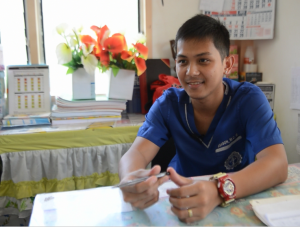Myles Clement Ababon represents the perfect antithesis to the often glamorized, glossy image of doctors.
Often seen wearing only a shirt, a pair of jeans, and sneakers, the charmingly plain and relatable 27-year-old physician is a doctor to the barrio.
He is one of the only two doctors who committed to help Davao City deliver health services to far-flung villages of Paquibato District.
For the past two years, the young doctor spends most days in communities of indigenous peoples in upland villages of Paquibato.
He eats with them and sleeps in their homes. This is an integration process that makes his efforts to bring health services to the people more comprehensive and ‘more connected’ — somewhat.
His journey to being a doctor was influenced by his parents — who are both doctors themselves. He took off after graduating from nursing school by availing a scholarship from the Department of Health (DOH).
He left medical school in 2014 and decided to work as a doctor to the barrio — and asked to be assigned in Davao City, his hometown.
“My parents are doctors, but being a doctor to the barrio was a personal choice,” he said. “I decided to work immediately as soon as I finished medicine.”
A doctor to the barrio may choose to work in wherever they want within the Philippines. However, a place near a doctor’s hometown is given top priority.

His decision to become a community doctor has been deeply influenced by his father, who also worked with the Ata tribes in Paquibato for years as a physician of the Davao City Health (CHO).
“I chose this community because my father used to work here,” he said. “Back when I was still a kid, I often went along with him.”
This allowed him to deeply understand the need of poor, far-flung communities for basic services, including health.
“These communities are far and the more that it is important for us to visit them regularly and provide them the health services that they need,” he said.
A day at work means Ababon traverses from one barangay to another to perform medical checkups. His patients are mostly children and elderly.
Over the past two years, Ababon has been endeared himself to the lumads , who treat him not only as part of their community but as a family. CIO






